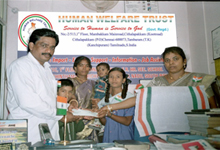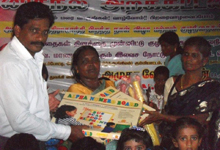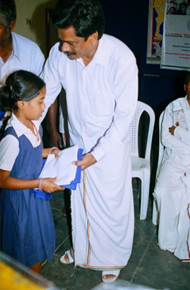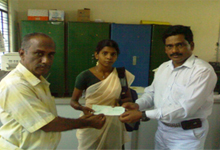Education Awareness Programme
Education is the primary and main aspect for the upliftment of society, empowering the underprivileged and provides them the necessary knowledge and skills. The education awareness programs as been conducted in all rural area of the state. “Awareness program should be conducted in all the rural area urban students and they should be in a position to choose the right course and navigate their career”.

Education is the basic investment which paves way for the all round development of the society. Therefore the society aspires to achieve its aim by guaranteeing basic education for all children in the society. To achieve this, government of tamilnadu is implementing free and compulsory education for all and especially for the poor children in tamilnadu. The progress and the bright future of the society totally depends on the basic education facilitated to young children.
The school education is also known as basic education or primary education.The school is one of the social institutions which paves the way for development of primary education in the society. Children are the future citizens. The school imparts discipline, character, conduct, responsibility, self control and confidence to youth. All the activities of the school thrive for the fulfillment of the expectation of the society.
Implementation Free and compulsory school Education for poor children in Tamil Nadu

The government of Tamil Nadu had put a frame with set of guidelines and sent a circular to the respective officials to activate Free and compulsory school Education for poor children in Tamil Nadu. In that frame, The Government of Tamil Nadu explained about the primary education of children should be considered as one of the basic rights of them. The government of India implemented a law for Free and compulsory school Education for poor children during 2009. As per the law, the basic free education should be given to all children those who are in the age group between six to fourteen. The government of India also has given rights to the state governments to implement respective guidelines for the same.Based on the above law; the government of Tamil Nadu published some new guidelines and sent it as a circular to all schools to implement the free and compulsory education for poor children in Tamil Nadu.

Following are the new guidelines for the implementation of free and compulsory education for poor children in tamilnadu
1. The twenty five percentages of the total seats in a school would be allocated for the Poor children in Tamil Nadu to get free and compulsory education.
2. The school has no rights to conduct any test or interview to select the poor children for free education.
3. The selection of the children should be made based on poverty and inability of their parents to pay the school fee.
4. The free education should be continued to the poor children until their primary education is completed.
5. The random selection can be made if the applications are more than the allotted seats.
6. The remaining seventy five percentages of the total seats also will be filled by certainnorms and conditions of school education act.
7. During the period of admission, the school does not insist the children to involve in any process of action.
8. The school does not consider about the education of parents of poor children during the period of admission.
9. The admission procedures and records will be transparent to the public for verification.
10. The Directors and higher officials of School education will periodically visit the school to verify whether your admission procedures and records are as per the norms or not.
Guidelines and rules of free and compulsory education for poor children in Tamil Nadu

The government of Tamil Nadu reserves the rights to punish the school which does not obey the guideline and rules given to them. The government of India implemented a law for Free and compulsory school Education for poor children during 2009. In which it explains, Rupees twenty five thousands can be collected as fine from the concerned school while violate the guidelines and rules for the first time. It may be of up to fifty thousand for the second time and consequently. The Government of Tamilnadu is also going to release a new government order about to collect the fine amount from the school which violates the rules and guidelines to provide the free and compulsory school education for poor children.
Human welfare trust is mainly working on the upliftment of the poor sector and providing the scholarship for the poor sector. Human welfare as provided scholarship to 60 students and amount 3 lakhs. This year on independence day our Human welfare trust as provided Note books, uniform, shoes ,bag, and other basic necessities for education for about 1600 children.
